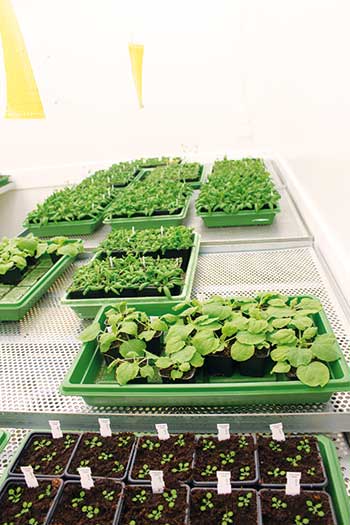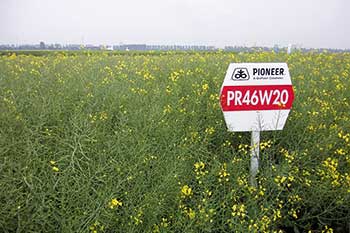An International Affair
Career prospects in molecular plant research
Career strategies for young European scientists
by Bettina Dupont, Labtimes 05/2013
Page 1 | Page 2 | Page 3
How do molecular plant scientists fare in Europe’s biotechnology-opposing environment? Lab Times inquired with company representatives and academics from Germany, Switzerland and the UK.
“The competition between molecular researchers is strong. On average, we are receiving around 100 applications per vacancy,” said Claudia Bölter, spokeswoman for the German plant breeder KWS, a company headquartered in the small city of Einbeck. The firm specialises in the breeding of crops for temperate climates and has 4,400 employees in 70 countries. KWS generates new plant varieties and produces and sells seed for maize, sugar beet, cereal crops, oilseed rape, sunflower and potatoes. At the R&D site in Einbeck, scientists are combining conventional breeding technologies with modern biotechnology to improve yields as well as resistance to disease, pests and abiotic stress. Since new vacancies being advertised at the beginning of the new fiscal year, from July 1st onwards, there are still many open positions. These are advertised on the company’s website (see box “Useful Links”), on the job portals jobvector, academics.de, academics.com and Xing as well as on the careers pages of seedquest.com.
At KWS, molecular plant scientists are working in fields such as cell and tissue culture, DNA diagnostics, genetic engineering and genomics. They are entrusted with basic and applied research, with the development of cellular and molecular tools and with the application of advanced methods in service units. “Some researchers also join our groups and departments responsible for plant breeding, regulatory affairs, quality management and intellectual property rights management,” Bölter explained.
Employed until retirement
“To fill a vacancy, we invite five to six candidates for a first meeting to get to know each other. From these, we select one to three candidates for a second interview,” she added. In this second round, the applicants have to present their thesis and discuss their work with KWS scientists. Applicants for group leader, project leader or scientific staff positions usually hold a PhD. “Due to their academic training, they are experienced in delivering results on schedule, in interacting and working with different colleagues and in reporting results at meetings,” Bölter said. “However, the career prospects in our company depend more on performance, expertise, scientific background and personal development and less on formal academic qualifications.”
At first, scientists are usually hired for a fixed term. “After a few years, we make the contracts permanent, in general,” Bölter told us. “Most scientists in our company are Research Associates. They are employed in consecutive projects. Some are promoted to group leader,” she said. The chances to stay on are good. The overall average staff membership at KWS is 15 years. “If scientists work adequately, they may stay with us until they retire,” the spokeswoman commented.
Key skills needed
The USA, Brazil and Argentina are key sales markets for KWS. GM crops are favoured in these countries. “Therefore, we will continue integrating green genetic engineering in our R&D work, despite the adverse political climate in Europe,” Bölter emphasised. “The combination of conventional breeding and modern biotechnological methods is crucial for our success.” Currently, KWS does not conduct field trials with genetically modified plants in Germany because of the lack of public and political support.
Asked, which skills would be in demand in the next few years, she replied, “Knowledge of modern breeding technologies, such as genomic selection, of new technologies in sequencing and microfluidics and of methods with regard to the stress resistance of plants.” Further valuable skills would be knowledge of analytical methods to enhance the speed and precision of phenotypic data collections and a background in molecular biology and bioinformatics.
Greener pastures overseas
“In Europe, our roles in terms of plant molecular biology and genetic modification are largely related to administration and policy,” said Andrew Tommey, Senior Regulatory Manager for Europe for DuPont Pioneer. “All of Pioneer’s R&D in this field is now conducted outside Europe given the continued reluctance of certain Member States to cultivate GM crops,” Tommey added. Globally, the company’s scientists develop maize, soybeans, sorghum, sunflower, alfalfa, canola, wheat, rice, cotton, pearl millet and mustard seed via both molecular genetics and conventional breeding. Whilst Pioneer has over 110 research sites in 25 countries on six continents, programmes in Europe are restricted to conventional breeding.
For new graduates in molecular plant sciences, it seems a good idea to look for jobs in the growing and emerging markets (see box “Useful Links”). “The US, South America and Asia, especially India and China, appear to have more to offer to graduates in terms of R&D positions than Europe. Jobs are being created there, largely because these countries are moving forward with biotech. Scientists are also needed for in-depth risk assessment studies and their analyses,” Tommey said. “In India, Pioneer has a new Regulatory Science group working on biotech and 40 to 50 people have been hired over the last few years.”
Arduous approval procedures
Tommey, a former researcher trained in plant molecular genetics, worked in the past for the UK government inspecting field releases of GM crops and subsequently for the European Commission as a policy officer for issues associated with GMOs. He recounted that, in 1996, there were 400 to 500 field trials with new biotech crops in Europe, many of which were conducted by small businesses. However, this has dramatically declined over the past few years. This year, only a handful of trials are being conducted in total across all companies. “The studies necessary for an application for approval of a new GM product in the EU cost millions of dollars. Where cultivation is concerned, they have to be conducted in the Member States where the product will be commercialised. As the EU regulatory requirements have continued to increase and with only one EU approval for cultivation of a new GM product – the BASF starch potato – in the last 15 years, small businesses have simply been driven out of the market,” he told us.
According to the EU Register of authorised GMOs, several companies also received authorisation for the use of their genetically modified cotton, maize, oilseed rape, starch potato, soybean and sugar beet in food, feed and for other products in the EU. The introduced genes mainly confer resistance to herbicides and tolerance to insects on the plants. In the case of BASF’s starch potato, the amylase content is strongly reduced.
Under EU legislation, a Member State can invoke a specific “safeguard clause”. It can provisionally restrict or prohibit the use and sale of a GMO in its territory because of scientifically-based concerns regarding the safety of the GMO. Six Member States have done so: Austria, France, Greece, Hungary, Germany and Luxembourg. “Such bans tend to be founded on politics rather than science and only add an additional hurdle to the commercial cultivation of GM crops in the EU,” Tommey said. In his view, politics and a lack of decision making have been the major factors in obstructing and scaring away commercial molecular plant R&D in Europe.
Changing strategies
In July this year, Monsanto announced that it will no longer be pursuing approvals for cultivation of new biotech crops in Europe. Instead, the company wants to expand its conventional seed production and breeding. The pending application to renew the approval for insect-resistant MON810 maize will not be affected.
In 2012, BASF Plant Science moved its headquarters from Limburgerhof, Germany, to Raleigh, North Carolina. The company stopped the development and commercialisation of all products targeted solely at cultivation in the European market. These include genetically modified starch potatoes. Research and development activities will be concentrated mainly in Raleigh, Ghent and Berlin. The company announced, it will focus on the more attractive markets for plant biotechnology in North and South America, and in Asia.
Biotech crops were grown worldwide on 170 million hectares in about 30 countries in 2012. The global leaders were the USA, Brazil, Argentina, Canada and India, the International Service for the Acquisition of Agri-biotech Applications (ISAAA) reported. Europe contributed only a small fraction with 129,000 hectares of GM maize in five countries, the leader being Spain with 116,000 hectares. Over 17 million farmers worldwide grew biotech crops, generally small resource-poor farmers in developing countries.
No reason to worry in Germany
”The future of molecular plant biologists does not depend on the acceptance of GMOs in Europe,” commented Martin Parniske, Professor and Head of Genetics at Ludwig Maximilians-University in Munich, Germany. His research group is investigating the interaction between plants and symbiotic or pathogenic microorganisms (see box “Useful Links”). He was recently awarded an ERC Advanced Grant by the European Research Council. “Although GMOs hold a lot of promise for increasing yield, resistance to pests and drought, the impact of molecular plant biology is not limited to transgenic approaches. Our knowledge of plant gene function and of the effects of genetic variants has grown exponentially in the last two decades, especially since we have the technical means to sequence whole plant genomes and to precisely determine the genotype of variants,” he explained. For this type of analysis and for the respective knowledge-based plant breeding, molecular plant specialists will continue to be needed.
“On a global scale, the cultivation of GMOs is widespread and the biotechnological development of genetically adapted plants will certainly continue. There would, probably, be more job opportunities in Europe if the political climate was more biotechnology-friendly,” Parniske noted. “To secure food quality and production, we have to maximise the diversity of plant germplasm resources [collections of living tissue, from which new plants can be grown, e.g. seeds, plants or parts of plants, BD] and revert the trend to global monopolisation. To increase the number of plant breeding companies in Europe and to give small breeders a chance, the extremely costly regulations for GMO approval should be simplified,” he suggested.
“Internationally, plant molecular biologists trained in Germany are recognised for their exceptional technical expertise,” he remarked. Trained personnel would be even more sought after in the future than today, he estimated. For a promising career in academia, he recommended a stint as a postdoctoral researcher in a leading laboratory in the USA or in the UK. Former members of Parniske’s research team have international positions as group leaders, postdocs, as a Study Manager at Bayer CropScience, as a manager of a genomics service unit, as a Programme Director for the German Research Foundation, as a college professor and as patent examiners and attorneys.
To improve the public perception of plant biotechnology in Europe, the plant geneticist advocated strengthening scientific education. “The achievements of outstanding scientists, such as plant pathologist Norman Borlaug, should become more common knowledge,” he said. Borlaug, a central figure in the Green Revolution, developed a high-yielding, short-strawed, rust-resistant wheat by conventional breeding. The new wheat was planted with success in Mexico, India, Pakistan, Central and South America, the Near and Middle East and Africa. In 1970, Borlaug was awarded the Nobel Peace Prize for his role in fighting world hunger.
Page 1 | Page 2 | Page 3
Last Changed: 01.10.2013








